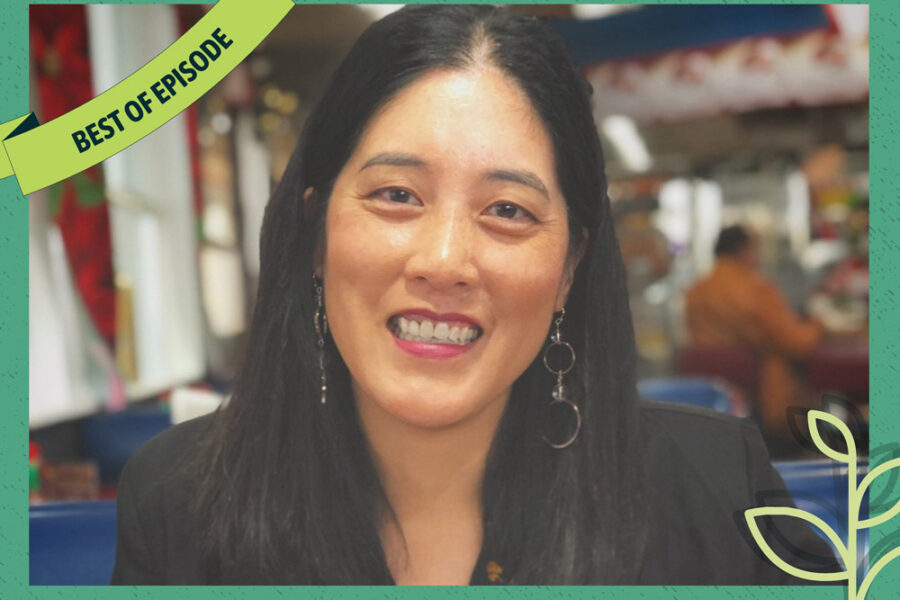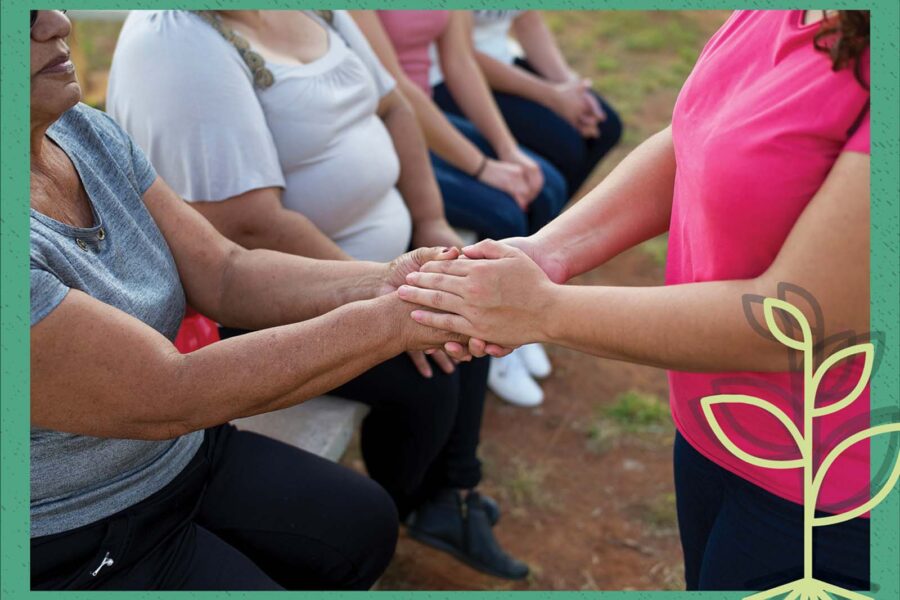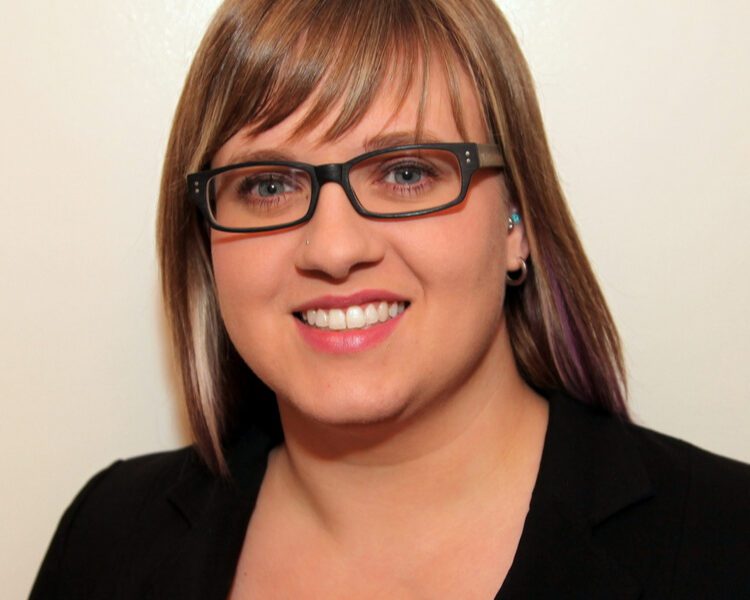As economic, environmental, and social crises accelerate, business must evolve. But how? Kenneth Baker, the co-founder, and chair of Antioch University’s MBA, has some ideas. In this conversation with guest host Jane Paul, he talks about the necessity of innovation and change for sustainability and social justice—and how a rising tide of crisis is being met by a new generation of business leaders who seek to address these issues at all scales.
Subscribe: Apple Podcasts | Spotify | Stitcher | Google | Simplecast
Episode Notes
Visit Antioch University’s website to learn more about the Master of Business Administration program that Kenneth Baker helped found and that he currently serves as the chair of.
Guest host Jane Paul teaches in the BA in Liberal Studies program at Antioch University’s Los Angeles Campus.
Listen to our Seed Field Podcast interview with Jane Paul in S4E7: We Can Build an Equitable Economy By Starting Small—and Right Now.
This episode was recorded on April 18, 2023, via Riverside.fm and released on May 3, 2023.
The Seed Field Podcast is produced by Antioch University
Editor: Johanna Case
Guest Host: Jane Paul
Host: Jasper Nighthawk
Digital Design: Mira Mead
Web Content Coordination: Jen Mont
Work-Study Intern: Sierra-Nicole E. DeBinion
A special thanks to Karen Hamilton, Amelia Bryan, and Melinda Garland
Guest
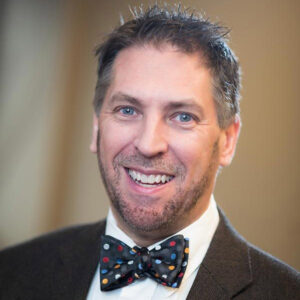
Dr. Kenneth Baker has been a successful entrepreneur owning and operating a restaurant/sports bar, a computer company, and opening a branch of a University. He has been in higher education for 19 years and held the positions of Professor, Dean, and Campus Executive Director. He has been recognized for Leadership Excellence in New Center Start-Up, Innovator of the Year, and led his campus to The Business Journal’s Best Places to Work in Dayton, Ohio. He holds several certifications, including Microsoft Office Expert, World Organization of Webmasters – web design, IC3 – computer core, and FEMA – Emergency Management Institute. He has been a technical editor for several McGraw Hill Textbooks, and he enjoys traveling to many schools across the nation being a site evaluator for ACBSP (Accreditation Council for Business Schools and Programs).
Guest Host
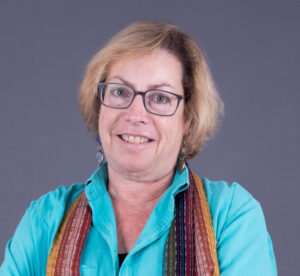
Jane Paul is a college instructor, activist, and advocate for economic, environmental, and climate justice, for housing rights, and for incarceral system reform. She teaches at Antioch University Los Angeles (AULA), in the undergraduate Urban Studies concentration, as well as in the Master of Arts in Urban Sustainability program, the Bridge Program, and the national Clemente Program. She is teaching, researching, writing, and developing curriculum on the solidarity economy, climate, and human rights.
S5 Episode 6 Transcript
Jane Paul: [00:00:00] This is the Seed Field Podcast, the show where Antiochians share their knowledge, tell their stories, and come together to win victories for humanity. I’m this week’s guest host, Jane Paul.
We begin with a land acknowledgement. At Antioch University, we strive to acknowledge our presence on the stolen lands of the native people. For those of us based in Los Angeles, this is the traditional, ancestral and unceded territory of the Tongva peoples. We recognize and honor the generations that have gone before as well as the present day Indigenous people. With this land acknowledgement, we take a step toward joining in decolonial and Indigenous movements for sovereignty and self-determination. Thank you for joining us. Now let’s get started. Today on the Seed Field Podcast, we are joined by [00:01:00] Dr. Ken Baker for a conversation about the ways business education can change in order to address the needs of a planet in the throes of a climate crisis, widespread injustice. As an alternative economy scholar, I am really excited for this conversation. Business and economic influences are evolving rapidly out of necessity to innovate and change for sustainability and social justice. There’s a rising tide of crisis, and at the same time, new generations community leaders, leaders are seeking to address those issues. So let me introduce our guest, Kenneth Baker.
Kenneth Baker sees leadership and change as intertwined, which is why he’s the chair of the Master of Business Administration Program here at Antioch University. This MBA program is distinctive because of its emphasis [00:02:00] on the triple bottom line, which is the idea that businesses should not just measure and be guided by their profit, but should also exist for the people serve and the planet they exist on. People, Planet, Profit. Dr. Baker—Ken—has been a successful entrepreneur owning and operating a restaurant, sports bar, computer company, overseeing the opening of a new branch of a university. He has been in higher education for 22 years and has held the positions of Professor, Dean, and Campus Executive. But more important than what I say is what Ken says. So welcome Ken to the Seed Field Podcast. We want to hear about you.
Kenneth Baker: Hi. Thank you so much. I appreciate it, and I’m happy to be here.
Jane: So we have some instructions. Ken, you and I, we always start with positionality so that our listeners have some context for who we are and where we’re coming. For example, I [00:03:00] will start. I’m Jane Paul. I am a white person. She, her are my pronouns. I live in Los Angeles originally, a New Yorker, indigenous to the Middle East. So Ken, if you’re comfortable, will you tell us where you’re coming from?
Kenneth: Yeah. It’s not very exciting. I’m a, a straight white male from Ohio basically from the Midwest, so that’s about what there is for me.
Jane: Okay. Well that’s exciting for some of us,
Kenneth: Well, that’s good.
Jane: Yes, and we’re very, very happy to have you here. It’s really a delight to talk with colleagues and to hear what’s happening across the country. It’s a sort of a unique thing about Antioch, is that we can reach out to folks across the country on our campuses, from Seattle to New Hampshire, from the Midwest to Los Angeles. and learn more about what we’re doing together and the work we’re doing together. So what you to the field of [00:04:00] education and specifically to teaching about sustainability?
Kenneth: So I just wanted to jump back to that acknowledgment piece from, uh, this part of the country, we have the Shawnee tribes that were prevalent in Ohio, uh, glad that we talked about this because it, led me to little further research.
Uh, we also have the Chippewa, the Delaware, and the Iroquois that were very prevalent in this part of Ohio along with the Miami tribes. So, I just wanted to jump back to that acknowledgment piece there.
So, what brought me to this part of my educational journey? You mentioned in the intro, I, owned a business and, while I was running that business, I got the opportunity to teach a class at our, uh, local community college here in.
And, I I pretty much fell in love with education at that point. So it was, teaching those classes where I there’s something about, as you know, Jane, when the, the lights come on for students that really, [00:05:00] uh, invigorates a person and just gets you jazzed up about education and so, I fell in love with it at that point, and then from there went on to various other roles as you mentioned.
But, being from this part of the country, you know, I was obviously very familiar with Antioch and its social justice mission and that much fell in line with my philosophy and my ideology as far as the, the mission and the long history of Antioch. So when I had the opportunity to come to Antioch, obviously I jumped on that and, came in as a, actually undergraduate instructor.
So, but not long after I got here the MBA Chair position opened up and they asked me if I would be interested in that. And so, naturally, I said yes and, kind of fell into it from there.
Jane: yes. I totally relate to the love for teaching. It was a surprise for me as well at 55 years old to discover that there was something new to do. And, is a beautiful thing and I really appreciate hearing about that as sort of your origin passion. [00:06:00] but tell us more about the MBA program specifically for folks that don’t know what it’s about.
Kenneth: Sure. I’ll say I And me in this, but just I wanna acknowledge that there was a group of us that were working on this. So, as many listeners know, there’s several campuses of Antioch University, When I first took over the MBA program, but we also had several MBA programs across the country, which were not aligned.
One of my main priorities coming on board was to get the curriculum to be, aligned with everybody in, in Santa Barbara and New England and online.
So it was an endeavor to go through, meet with all the different chairs from the different campuses, and agree to a unified curriculum, a unified number of credit hours, and, pretty much align the programs altogether. So we did that. Um, and While we were unifying, we were also consolidating to what we have now, which a unified online MBA program.
Jane: folks so people could, [00:07:00] enroll and anywhere and participate in that program. That’s right?
Kenneth: Correct.
Jane: I like that story about the alignment can very much because, what you described that sort of collaboration, is a leadership model. And I think that idea you’re sharing that programs were disparate, more with a lack of, cohesiveness. And that your gift was to be able to bring folks together and collaborate and cooperate. And that’s a beautiful model for your students. And I wonder if you could describe leadership modeling as part of a goal of the program. So if we are asking students to innovate in business and innovate in leadership in order to address the needs of the changing world, what are the goals for you and for the other folks in the program around that?
Kenneth: Well, let me just step back [00:08:00] just a minute and talk about the program itself because, as we looked at and reviewed the program, we thought to ourselves, you know, how are we gonna distinguish ourselves from the many other MBA programs because there are so many programs out there, especially online and borrowing a little bit from New England, because their focus was already entrenched in sustainability and, The, whole environmental friendliness piece. So we thought, let’s build upon that and let’s make this MBA program a triple bottom line focused program so that we stand out from a lot of the other ones that are out there and we capture not only a market of like-minded individuals in the name of sustainability and environmental friendliness, but also in a direction where, uh, we feel business is headed. This is not a new concept. but, for us to. Be right out front with and say know, in our program, you’re gonna get not only exposure to this, um, entrenched in this of philosophy kind of a new way to run a business.
Jane: It it’s very exciting actually. And it is a new [00:09:00] thing to think really, to be able to implement different priorities, as a leader, in commerce in our economy. And so that new, methodology, that new perspective where we care enough to make sure that there are approaches to running a business that consider more than profit and more than the bottom line. How does that work for folks who are in the field, whether they’re still in the program or they graduate from the program and they’re running businesses, how do they manage to balance things like cost factors and revenue streams with these other priorities and these other issues that encompass care for the planet and for social justice?
Kenneth: Let me step back and, and talk a little bit about the triple bottom line because, as listeners may know, the triple bottom line is about say [00:10:00] the three Ps, people, planet, and profits, right? So obviously, businesses have to have a profit to run and remain stable. We definitely know that we have to focus on the profits, but we’re not gonna solely focus on the profits. And, you know, when I went through my MBA program, it was about, Over and above in everything else. You want to make sure you’re increasing shareholders’ wealth.
That was the main priority. And we didn’t look at much else but today we have to look at more than just that, right? We have to look at and consider the planet and the people. it’s, a different way of doing things because, a lot of times, business owners or running small businesses didn’t consider the people as much maybe as they should have. So, part of what we teach in the program is talking about the several ways that you can incorporate sustainability. And surprisingly, you can, look at sustainability issues that, also increase your profit.
So that’s kind of the, the nice piece is [00:11:00] when you look at different things, packaging, lighting, water use, um, transportation and distribution.
When you take a look at, for example, distribution channels and make them more efficient, you’re you’re helping the environment right, is part A, but you’re also saving money as part B. You know, sometimes it’s, business leaders are so focused on, running the business that they may not consider some of these things. And so as the students move through the program, I think it’s, uh, just a different way of looking at things or at least acknowledging that there’s a different way to examine kind of how you run the business and consider different things to consider as you’re running a business other than just, making money and the bottom line.
Jane: When students come to you, Ken, are they coming with, already set ideas? So they’re signing up for this particular program because they have common ethos around making the world [00:12:00] a better place and can you talk a little bit about the specific classes that the students take and if you see them connecting to those?
Kenneth: Yeah. Well, first part of your question is about the students that come, what, what we’ve seen a lot of is, alumni know, we had a little bit actually at Antioch of, of pent up demand for an MBA program And so the, a lot of alumni when we offered this, uh, were quick to sign up for the program because they already understand Antioch and of what we’re about and already think very Antiochian as we like to call it. Right? So they, they already have these kind of things in in the back of their mind. It’s kind of like a no-brainer for them that Oh, of course we’re, you know, an MBA with a focus on sustainability and the triple bottom line just makes sense, right? That’s, that’s how we already think. So, know, the rest of the students are people who are maybe are looking for an MBA and then discovered our program and it appealed to them, right? Because how we are operating and how we run it and how we have it designed. So The students [00:13:00] coming in, none of them are shocked about how we are running it. They’re all kind of already leaning that direction as far as, all right, this is what I’m looking for. It’s not a necessarily traditional focus on profits, mba, this is a different way of doing things.
Jane: What kind of classes, what kind of curriculum,
Kenneth: Yeah.
Jane: um, are, are you offering, uh, that you think really specifically directs and guides the students, towards fulfilling all of those priorities which can often be competing?
Kenneth: Right. So, finance and accounting and statistics, those are things that are traditionally in an MBA program. Obviously, you have to have some sort of accounting background to come out and be able to run a business, or be an executive in a bigger organization.
So understanding those things is obviously important, but is there a way to look at accounting, for example, with, uh, sustainability eye? And of course the answer is yes. Right? I mean, the [00:14:00] accounting nowadays especially in bigger corporations, you know, investors are not looking specifically at income statements anymore. They’re looking a lot at but what are you doing for the environment? Or what are you doing in the name of sustainability and. More and more, especially with the, uh, internet and the chan open channels of information flow, and the specialized interest of millennials, uh, in particular who are looking at, how a business operates, right? They, they look at a product and they take that extra time to investigate the background of the company. So as this person or people, are they producing environmentally sound products? Are they sourcing their products from, know, environmentally friendly places? And so companies realize this and have, now I have started reporting, you know, I think the statistics over 90% of, most major companies now are putting some type of sustainability statement on their website and in considering that. So, as I was mentioning, [00:15:00] the accounting piece is not alright, just numbers, right? But also how are we gonna look at those numbers and how do they equate back to, uh, a sustainability piece? And we find ways of doing that.
Economics is another one that can be a very dull subject. In economics there’s lots of ways think about economics and, and the economy and how the effects of sustainability are affecting the, the economy and how a company operates, right? So, in all the classes we take, uh, a stance that’s. All right. Well, you run a business, you can do these X, Y, and Z things, but can you, is there anything else that you can do that will make your product more sustainable, make your business more sustainable and help you operate in a more efficient way and lean more towards the, uh, circular economy?
Jane: I know you have a book on your bookshelf, Ken, called Doughnut Economics
Kenneth: Correct. Yes, you do. Yes, I do.
Jane: Can you talk about that for a minute and maybe even describe what a circular economy looks like?
Kenneth: [00:16:00] Yeah, that’s, yeah, that’s a great segueway. So, know, in, Kate Raworth’s book, uh, uh, in Doughnut Economics, she talks about, the circular economy, which is essentially. We have a finite amount of resources on this planet, and we, uh, as humans have been very good, especially since the industrial revolution of using up products, right?
So we mine for the coal, we mine for this, we mine for all these minerals. We use them up and then we throw ’em away. And we can do that probably for a very long time. But at some, it’s, these things are gonna run out, right? So we, we don’t have it. It’s not an infinite amount of resources. that’s a pretty easy concept for people to understand, what the book talks about. And, what we talk about in our classes is the fact that, all right. It’s kind of cradle to grave, you know, that concept is a product comes about. We use it and we throw it away, and so it’s cradle to grave and the concept more focuses on cradle to cradle, right? So we’re talking about.[00:17:00] recycling, we’re talking about, uh, products that are able to be reused. Um, and it’s not just, uh, recyclable pieces, right? It’s it’s electronics, it’s, um, all the different products that maybe get thrown away. Uh, how can we think about these in a way that will be able to be either reused, recycled, or repurposed? Uh, even, you know, even clothing manufacturers are coming on now, uh, where we can turn in your, your old clothes and have reused instead of sending them to the dump. And that’s the big piece, is recognizing the fact that we don’t have an infinite amount of resources.
Jane: Thank you, Ken, for explaining that and I really appreciate that you brought up the point that lots of major corporations have a sustainability link or a page or a statement on their websites that they’re broadcasting. That they’re doing that work, and some of that as, as you mentioned, for.[00:18:00] Good intentions,
Kenneth: Mm-hmm.
Jane: some of that is because it is part of a marketing strategy and that big corporations are seeing that there’s some demand and some need for people to about their inner workings, right? What happens? behind the closed doors of their, corporations. And so it’s great that they’re trying to highlight and broadcast the good work that they’re doing.
It’s also very much, a strategy that is part of their, profiteering because it will bring in more customers. It used to be called just goodwill, right? Or now it’s corporate responsibility and there are some other ways to frame it. And so that’s great. So if we see big companies, car companies, or big clothing companies talking about their sustainability measures, it does bring in customers and then I think it also serves to demand a little bit more accountability and a little bit more transparency. [00:19:00] I don’t know that there’ll ever be enough of that. Right? We could always stand to learn more about the inner workings of certain industries, but just to think about this in another way in terms of the students and, and where they’re headed. Traditional business schools use case studies from corporations and from mega nationals and Pepsi and Chevrolet and Uber, for example, in the, in the coursework. But we also know many of the students and, and many of the practitioners are going to be part of small and medium sized entities, not necessarily big corporations, and that small and medium sized businesses are really the heartbeat of our economy and the job creators in the business sector of the US and that they tend to be community minded, [00:20:00] in a different way than a corporation where the leadership is in a different city, in a different state, and maybe even in a different country. So my question to you is about preparing students to lead smaller entities. What is, uh, this kind of triple bottom line management leadership like for folks who have smaller organizations in their sites?
Kenneth: Some of our graduates are gonna go work for those big companies, right? And they’re, they’ll be, uh, and probably indoctrinated into whatever sustainability piece that that company has. But you’re right, a lot of them will not, a lot of them will work for the smaller or medium size companies.
Uh, A lot of times it’s about having awareness and it’s about educating. So if you go work for a company, let’s say a medium size, and sustainability is not on their radar for one reason or another. our graduates are coming out with the mindset of [00:21:00] looking at this, type of situation, right?
So they’re looking for, how can we be more efficient? Which again, as I mentioned, you know, being more efficient equals to efficiencies, right? But a lot of times also equals savings and also equals saving the environment, right? Because a lot of times being more. Means, in smaller businesses, right?It could be using led light for instance, you know, in a, in a warehouse, know, that’s, an energy saving piece, but guess what, it also saves money. Say you come in and you’re the, an executive in a business and maybe the CEO hasn’t thought about something like that because they’re too busy running the business, right?
So as, uh, one of our graduates comes in, Hey, have you thought about this? Or maybe we could do that to help, uh, increase our efficiencies, a, save money, and B, save the environment at the same time. Uh, it’s like I said, it’s just about thinking a different way or at least acknowledging that there’s different ways to think about things or different things to examine and the way a business runs and operates.[00:22:00]
And it’s all businesses, small, medium, and large that can take a look at this. And, um, I mentioned it’s about educating. I think it’s about getting the attention of the decision makers and bringing this to the, uh, forefront or bringing us to the conversation. Because a lot of times they, uh, you know, like I said, CEOs may not have had the time to worry about it would be the way they would probably think about that. But if someone’s saying, hey, you know, we can do X, and it leads to Y uh, and the Y is saving money, but oh, by the way, we’re also saving the environment, then why not? Why wouldn’t you do that?
Jane: So that’s wonderful information for your students to take out into the world, regardless of the size of the organization that they’re going to, and, um, You know, whether it’s their own business and, and they need to save the money or they are able to influence leadership and uh, and save money and save the planet. All of that is lovely. I’m gonna make a quick shameless plug here for some [00:23:00] work we did in Los Angeles a few years back, there was a citywide policy called Cleanup Greenup that was, working to address the negative environmental impacts of businesses and industry in certain neighborhoods. And as a part of a policy group, we realized that not only did we need elected officials to champion this policy and that we needed the community-based organizations who were deeply involved with the health of their communities on the ground, but we also needed to support the business community. And so we created something called The Guide to Green that has, uh, information from entities like the Small Business Authority, uh, statewide entities. regional entities and local city entities like the water and power company, for example, or the Bureau of Sanitation that actually had specific tools [00:24:00] and programs and grants and technical assistance for businesses So, the, the business community was wildly grateful to have that information. Not only did it help them in the ways that you have described, but it also helped them comply with legislation and policy, which is something that businesses come across on a regular basis now.
Kenneth: Yeah. That’s awesome. You know, we use, uh, San Francisco in my, my class a bit because, know, here in the Midwest, I’ve only ever seen two trash system, right? We have trash and recycling, and San Francisco has a three-bin system where they have trash, recycling and compost, you know, these kinds of things that we may not think about, but every community needs to do that, right? You know, the United States needs, in my opinion, to focus a little bit more on how can we. How do we keep stuff outta landfills, and how do we make things more, you know, lean towards the circular, you know, back to the circular economy again? It’s nice to look at California and the progressive thinking that happens there and and a lot of the students, you know, aren’t from California, so it’s, it’s [00:25:00] news to them when you’re coming from a different to see things like that. Maybe difficult to implement, it probably wasn’t a cakewalk for San Francisco to put whole new bin and a whole new place to take refuge and, you know, all those things. But think of the savings for the environment. That’s the, you know, but kind of the bottom line.
Jane: Thank you for the California shout-out. We certainly appreciate that we get a little bit of flack for our, uh, regulations from time to time, but, um, we are progressive and love the idea of being a role model and something that you said is really important. So we talked about, uh, for example, energy and water conservation, how can be helpful to the business owner and really have a positive impact on the environment. And you mentioned landfill and waste is a big topic of conversation in a lot of different sectors right now, whether it’s clothing, construction, and one piece of that is sort of leading me to the question I wanted [00:26:00] to ask you. You talked about a landfill. So if a company sends less trash to a landfill and that landfill is down the street from where the employees work or where the employees live or down the street from the children of the families, of the people who are part of that business. That has a really, um, important impact on public health for those folks and public health and productivity and, um, the wellbeing of, uh, the folks who are involved, the stakeholders and employees of an organization is critically important, and that I wanna say is part of the people part. So we’ve been talking a lot about the planet part how that might impact the profit part, but the third aspect of [00:27:00] your program is people. And so, I just would ask to expand on that a little bit more. Maybe talk about the public health piece or how about worker conditions or living wages or even a worker’s sovereignty. So are the workers in a business able to have a voice in the process? Um, is there such a thing as community engagement. So can you expand for just a few minutes on the people part?
Kenneth: Yeah, I’m smiling because, uh, You did a great job of talking about all the parts of the people, right? You, yeah, it’s all those things. It’s everything that you mentioned and, and it’s about, uh, recognizing that, employees are not just a, a cog in the, the turning spindle of business, right? It’s more about how to treat people as people and to respect [00:28:00] them as individuals and, you know, great leaders understand that taking people’s feelings, I mean, honestly, into effect. Uh, and getting to know employees and listening to employees, probably most importantly, is what, uh, helps affect the bottom line, right? So, when you have happy employees, you have less turnover. You have, you know, the whole thing is, comes full circle. Uh, because turnover is, you know, immensely expensive for people, um, for businesses and having happy employees. Which, you know, is beyond me, why some leaders don’t grasp that concept of, oh, well, you know, if I have happy employees, they stick around, and it ends up costing me less money. But yet, it’s the stories of all the, know, horrible bosses out there that don’t listen to the employees and don’t take their feelings into consideration and just ignore; those are the ones that suffer. Um, and it, it’s amazing to me that they still survive, I guess in my opinion. And by the way, when you listen [00:29:00] to employees, you a lot of times come up with what time saving things, right? Uh, efficiencies And it’s about doing away. Well, this is always the way we’ve done it kind of philosophy where, well, maybe the way we’ve always done it isn’t the most efficient or isn’t the way that we’ll create the most employee engagement and our most employee happiness. So, to me, it seems like basic and elementary type of, of philosophy of if you run a business, you need to listen to your employees, but it seems to escape a lot of, uh, leaders for some reason. And so, it’s a just a, a whole, myriad of possibilities where you can take people into consideration and basically treat them as humans, right? Treat them as people that are not just somebody that’s doing your job for you, but also someone that’s helping you achieve your goals and objectives as a leader.
Jane: Yes. That’s wonderful.I think it might be considered a humanitarian approach.
Kenneth: Sure. Yeah, absolutely.
Jane: to, uh, to leadership and to [00:30:00] management. I wholeheartedly agree that the workers actually will bring probably the most creative and the most innovative problem-solving skills because they know what the, uh, day-to-day work is, what the literal machinations are, how the machinery operates, and that it is a much more fulfilling experience for any individual to have a voice into just feel like a, a nameless cog in the wheel. And there are organizations that are converting to worker ownership, uh, for several reasons. One is that we do have some new perspectives like your program is offering on what the economy could look like, and that might include more equity, not just in terms of wages, but a kind of a place in, uh, the economy and the [00:31:00] idea of think outside the boss, right? Where the workers are, the owners. So there’s a lot of lovely innovation that’s happening, and it is largely because of the needs of the people to participate in something where they can equally thrive and not feel crushed. And it is critical for leadership and management have that perspective if we wanna continue to have a world where we address equity in social justice issues.
Kenneth: Yep.
Jane: So to wrap up, you’re now in 30 years, three decades-ish of, of business education. Can you say what inspires you? What gets you out of bed in the morning? What’s the passion for you?
Kenneth: Yeah, no, I think it kind of comes full circle in education, I think. You know what, what ignited me in the beginning is what still ignites me today. I think, although [00:32:00] I’m not in the classroom as like previously, it’s still, I still get to contact and communicate with students. And I think, know, seeing the light bulb come on over people’s heads is just a rewarding experience. I think there’s nothing better to me than helping a group of people, especially when it’s in a, in a, in a group setting where they’re like, yeah, well that really makes sense, or, you know, well, I never really thought about it that way. And seeing that happen with students and knowing that they’re going out into the world and, and helping communicate that to know, probably everybody they come in contact with, not just a business, but there’s, you know, a certain way of living, right? That’s more sustainable. know, we talk about that in our classes as not only is this applicable to my business, but there’s things I could be doing on a personal level that will help, uh, with the environment and social justice and, you know, all those types of things as well. So it’s the amount of learning that happens and watching that transpire with the students that really jazzes me up and it does get me outta [00:33:00] bed in the morning, and, and it helps me keep pressing on and, really brings a lot of pleasure to what I do.
Jane: So wonderful, Ken. Thank you so much. I feel like there’s a lot of value in, this idea that in order to build, we have to be able to envision it. Right. We have to dream it, and we have to see it in order to make a better world happen. So I just wanna thank you for doing your work around building that vision for our students and all the folks in our community.
Kenneth: Yeah, it’s my pleasure, and like I said, I think you’re right. I think education is key, right? It it, the more people that understand what’s, what’s happening and how to fix it, the better off we are.
Jasper Nighthawk: The MBA program that today’s guest, Kenneth Baker, co-founded and chairs, is available in a low residency format accessible to students across the country and around the world. We’ll put the link to the page on Antioch’s website where you can learn more about that in our show notes.
We’ll also link in our show notes to the program page for the BA in Liberal [00:34:00] Studies offered on our Los Angeles campus. That’s where our guest host Jane Paul teaches, and we’ll link there to my Seed Field podcast interview last season with Jane Paul, where we talked about how to build economies that support everyone to thrive.
You can find these show notes inside your podcast player, but we also post them on our website, the seed field.org, where you’ll find other extras, like full episode transcripts, prior episodes, and more. The Seed Field Podcast is produced by Antioch University. Our editor is Johanna Case. Today’s guest host was Jane Paul.
I’m your regular host, Jasper Nighthawk. Our digital designer is Mira Mead. Jen Mont is our web content coordinator. Sierra-Nicole E. DeBinion is our work-study intern. And a special thanks to Karen Hamilton, Amelia Bryan, and Melinda Garland. Thank you [00:35:00] for spending your time with us today. That’s it for this episode.
We hope to see you next time. And don’t forget to plant a seed, sow a cause, and win a victory for humanity from Antioch University. This has been the Seed Field Podcast.


